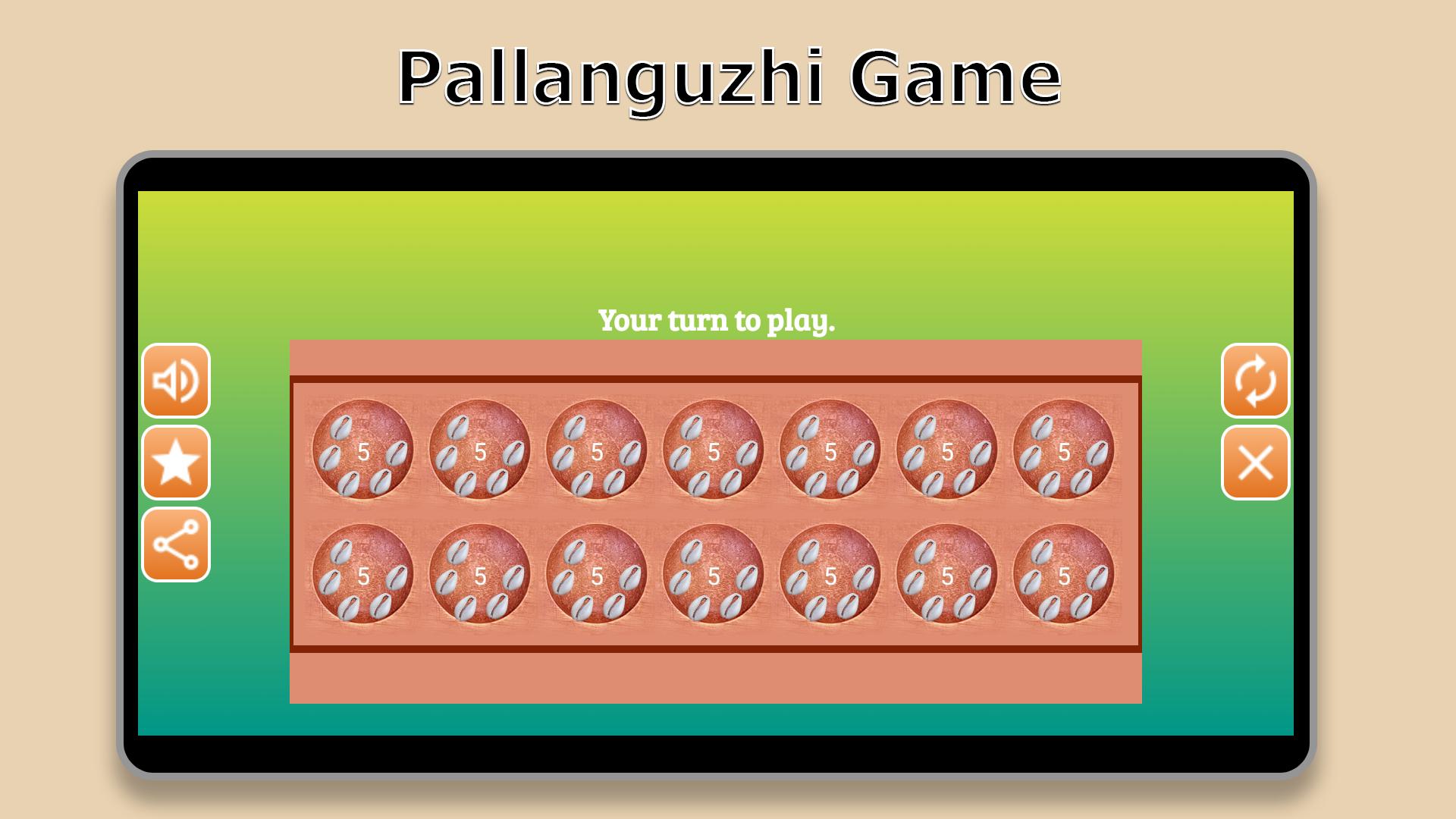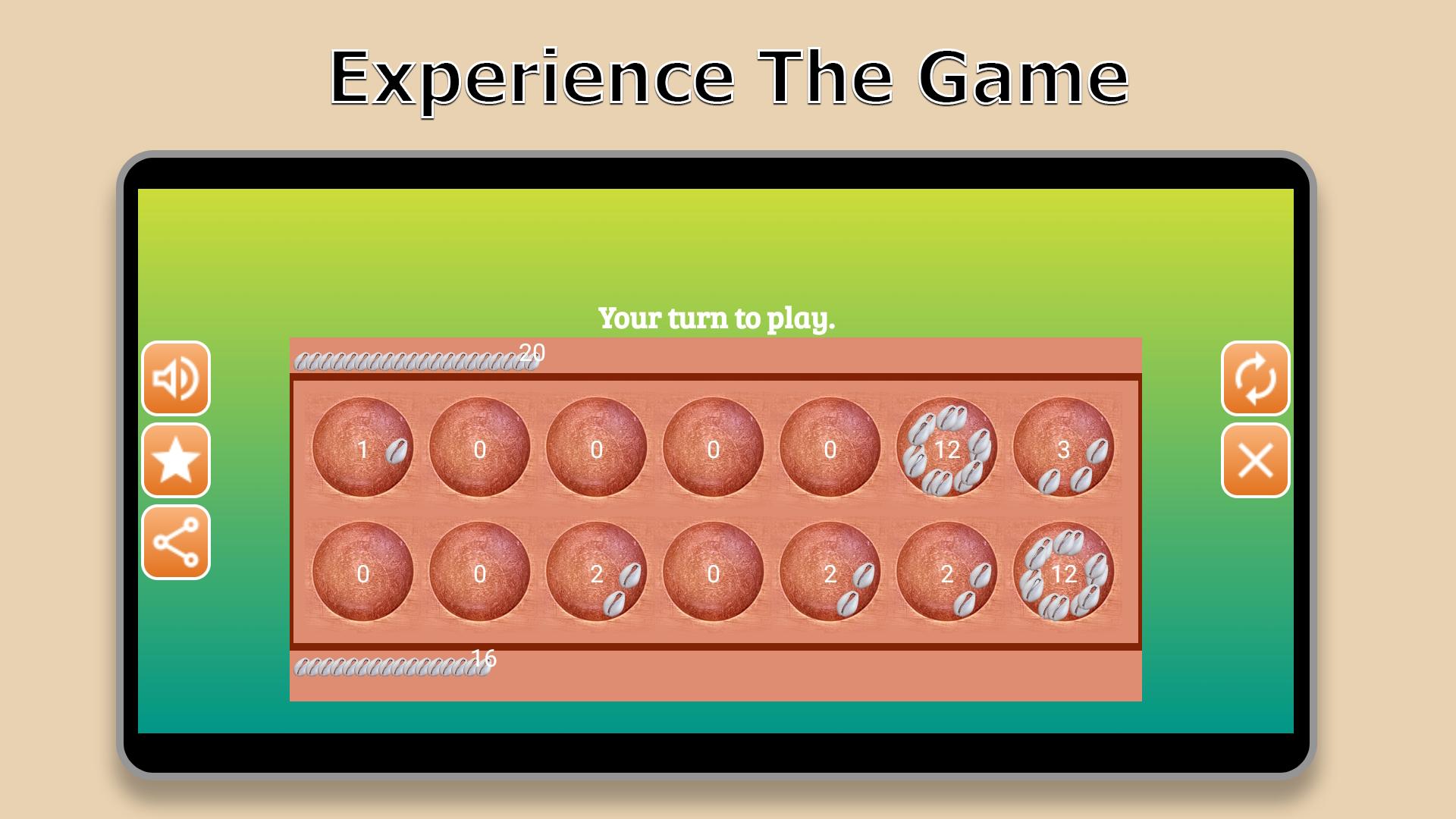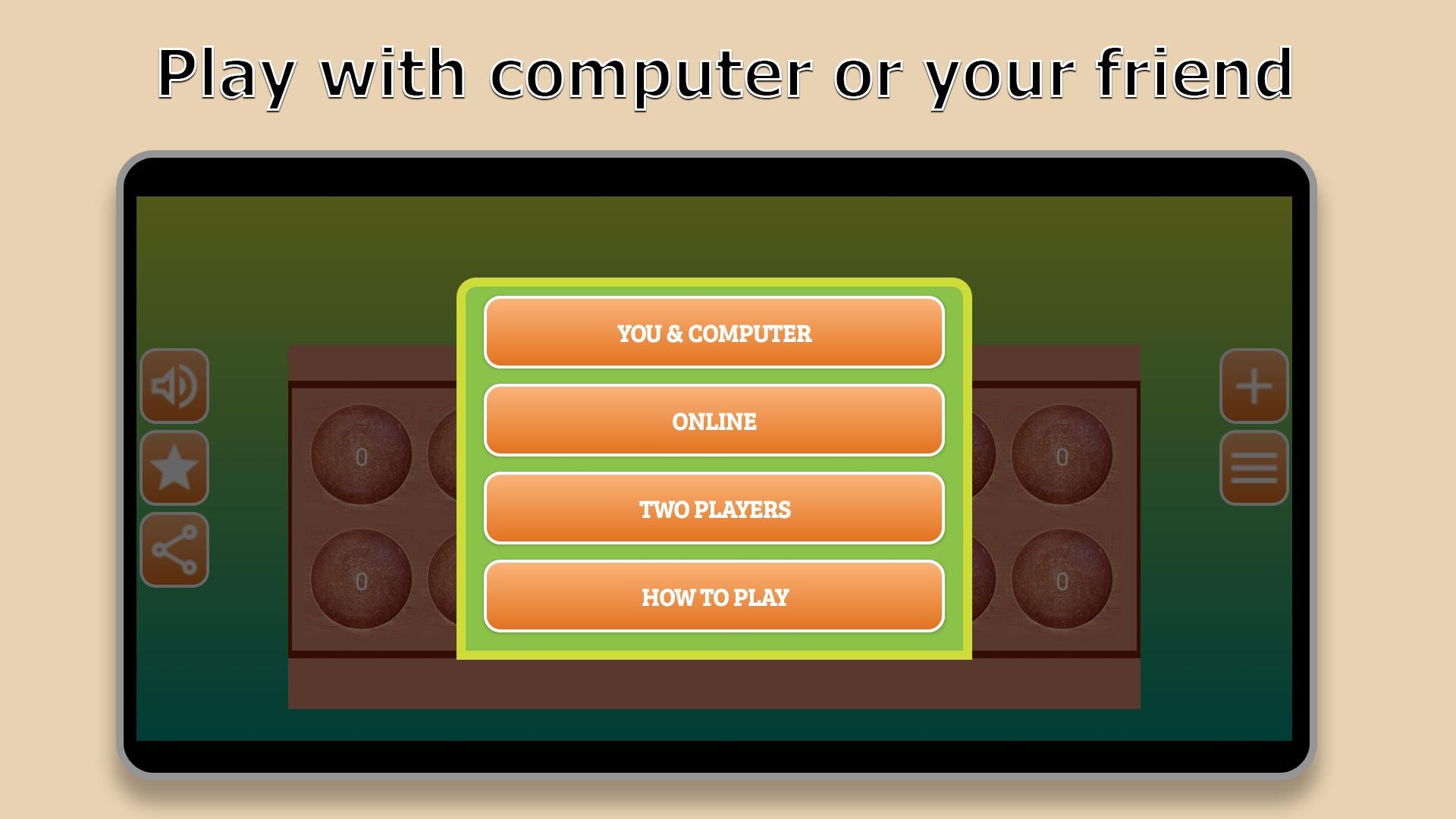Pallanghuzi is a traditional ancient mancala game.
Pallanghuzi is a traditional ancient mancala game played in South India. This game use the Variant called Ali guli mane (in Kannada).
The game uses two rows of 7 holes each. Each player "owns" the row of holes closest to him/her. The game starts with 70 pieces (small shells), with 5 in each hole.
In each turn, the player removes all seeds from a hole and distributes them. Once the last of the seeds is placed, the player take all the seeds in the next hole and continues placing them in this way.
If the next hole is empty the player stops and captures all the seeds in the hole next to the empty one, and all those in the hole opposite it.
How to play online with your friend.
Either you or your friend need to give the other his/her game ID.
The person who receive the friend's game ID, choose "Join Game" and enters the game ID while the other person choose "Create Game".
The game ID is in "Main Menu" then "Game Info".
How to play with random opponent
- Click on New > Online > Match Opponent.
The computer will connect you to anyone who also have done the same thing.
Thank You.
What's New in the Latest Version 5.1
Last updated on Jul 6, 2024
[ v5.1 ]
Bug Fixed and Optimized.
Thank you for playing.
Introduction
Pallanguzhi, also known as Alaguli Mane in Kannada, is an ancient two-player board game that originated in South India. It is a popular game in rural areas of India, Sri Lanka, and Bangladesh, and is often played during festivals and social gatherings. The game is played on a wooden board with 14 pits, seven on each side, and four larger pits called "stores" at the ends of the board.
Objective
The objective of Pallanguzhi is to capture more seeds than your opponent by moving seeds around the board and capturing them in your store.
Setup
The board is set up with seven seeds in each of the 14 pits. Players sit facing each other, with their stores on their right-hand side.
Gameplay
The game starts with one player choosing a pit on their side of the board and picking up all the seeds from it. The player then distributes the seeds one at a time, counterclockwise, into the following pits. If the last seed lands in an opponent's pit containing one or more seeds, the player captures all the seeds from that pit and adds them to their store. The player then continues distributing seeds until the last seed lands in an empty pit.
Capture
If the last seed lands in an empty pit on the player's side of the board, the player's turn ends. If the last seed lands in an empty pit on the opponent's side of the board, the player gets an extra turn.
Multiple Captures
If the player captures seeds from multiple pits in a single turn, they continue distributing seeds until they land in an empty pit or capture all the seeds from the opponent's side of the board.
End of the Game
The game ends when all the seeds have been captured by one player or both players have no seeds left to distribute. The player with the most seeds in their store wins the game.
Variations
There are several variations of Pallanguzhi, including:
* Six-pit Pallanguzhi: Played on a board with six pits on each side and two stores.
* Seven-pit Pallanguzhi: Played on a board with seven pits on each side and two stores.
* Katta Pallanguzhi: Played on a board with 14 pits on each side and four stores.
Strategy
Pallanguzhi requires both strategy and luck. Players need to think ahead and plan their moves to maximize their captures and minimize their losses. They also need to be aware of their opponent's moves and try to anticipate their strategy.
Pallanghuzi is a traditional ancient mancala game.
Pallanghuzi is a traditional ancient mancala game played in South India. This game use the Variant called Ali guli mane (in Kannada).
The game uses two rows of 7 holes each. Each player "owns" the row of holes closest to him/her. The game starts with 70 pieces (small shells), with 5 in each hole.
In each turn, the player removes all seeds from a hole and distributes them. Once the last of the seeds is placed, the player take all the seeds in the next hole and continues placing them in this way.
If the next hole is empty the player stops and captures all the seeds in the hole next to the empty one, and all those in the hole opposite it.
How to play online with your friend.
Either you or your friend need to give the other his/her game ID.
The person who receive the friend's game ID, choose "Join Game" and enters the game ID while the other person choose "Create Game".
The game ID is in "Main Menu" then "Game Info".
How to play with random opponent
- Click on New > Online > Match Opponent.
The computer will connect you to anyone who also have done the same thing.
Thank You.
What's New in the Latest Version 5.1
Last updated on Jul 6, 2024
[ v5.1 ]
Bug Fixed and Optimized.
Thank you for playing.
Introduction
Pallanguzhi, also known as Alaguli Mane in Kannada, is an ancient two-player board game that originated in South India. It is a popular game in rural areas of India, Sri Lanka, and Bangladesh, and is often played during festivals and social gatherings. The game is played on a wooden board with 14 pits, seven on each side, and four larger pits called "stores" at the ends of the board.
Objective
The objective of Pallanguzhi is to capture more seeds than your opponent by moving seeds around the board and capturing them in your store.
Setup
The board is set up with seven seeds in each of the 14 pits. Players sit facing each other, with their stores on their right-hand side.
Gameplay
The game starts with one player choosing a pit on their side of the board and picking up all the seeds from it. The player then distributes the seeds one at a time, counterclockwise, into the following pits. If the last seed lands in an opponent's pit containing one or more seeds, the player captures all the seeds from that pit and adds them to their store. The player then continues distributing seeds until the last seed lands in an empty pit.
Capture
If the last seed lands in an empty pit on the player's side of the board, the player's turn ends. If the last seed lands in an empty pit on the opponent's side of the board, the player gets an extra turn.
Multiple Captures
If the player captures seeds from multiple pits in a single turn, they continue distributing seeds until they land in an empty pit or capture all the seeds from the opponent's side of the board.
End of the Game
The game ends when all the seeds have been captured by one player or both players have no seeds left to distribute. The player with the most seeds in their store wins the game.
Variations
There are several variations of Pallanguzhi, including:
* Six-pit Pallanguzhi: Played on a board with six pits on each side and two stores.
* Seven-pit Pallanguzhi: Played on a board with seven pits on each side and two stores.
* Katta Pallanguzhi: Played on a board with 14 pits on each side and four stores.
Strategy
Pallanguzhi requires both strategy and luck. Players need to think ahead and plan their moves to maximize their captures and minimize their losses. They also need to be aware of their opponent's moves and try to anticipate their strategy.











